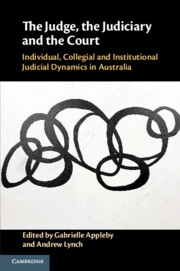 The Judge, the Judiciary and the Court
The Judge, the Judiciary and the Court from Part III - The Judiciary as a Collective
Published online by Cambridge University Press: 04 May 2021
The publication of a dissenting judgment is overt evidence of judicial disagreement and judicial difference. This chapter starts to explore the factors that underpin this judicial difference. Drawing on a method of content analysis of legal judgments grounded in theories and techniques from psychology, this chapter highlights the values that underpin decision making and disagreement in the High Court of Australia. The value analysis provides an insight into division in the High Court reframing the discussion of dissent from differences in understandings of the law to differences in the values espoused and affirmed by the individual decision maker. Rather than a binary decision between one outcome and another, value analysis of the judgments frames judicial decision-making as a nuanced balancing of competing value(s) by the individual Justices. In doing so, the chapter presents a value-decision paradigm with differential patterns of values expression associated with opposing positions in hard cases. Value expression provides an element of consistency in decision making across these difficult cases, but the analysis of values also highlights the complex nature of the High Court decision-making process and the many factors that may influence the final outcome.
To save this book to your Kindle, first ensure no-reply@cambridge.org is added to your Approved Personal Document E-mail List under your Personal Document Settings on the Manage Your Content and Devices page of your Amazon account. Then enter the ‘name’ part of your Kindle email address below. Find out more about saving to your Kindle.
Note you can select to save to either the @free.kindle.com or @kindle.com variations. ‘@free.kindle.com’ emails are free but can only be saved to your device when it is connected to wi-fi. ‘@kindle.com’ emails can be delivered even when you are not connected to wi-fi, but note that service fees apply.
Find out more about the Kindle Personal Document Service.
To save content items to your account, please confirm that you agree to abide by our usage policies. If this is the first time you use this feature, you will be asked to authorise Cambridge Core to connect with your account. Find out more about saving content to Dropbox.
To save content items to your account, please confirm that you agree to abide by our usage policies. If this is the first time you use this feature, you will be asked to authorise Cambridge Core to connect with your account. Find out more about saving content to Google Drive.